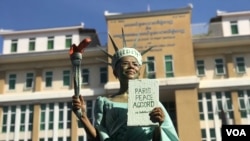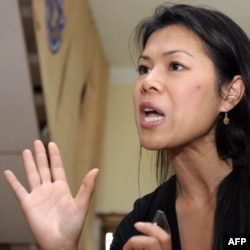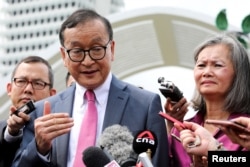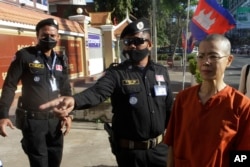Theary Seng knew what was coming as she headed to the Phnom Penh Municipal Court on June 14, 2022, and she had prepared for it.
Judges handed down an six-year sentence to Seng, despite the evidence against her amounting to Facebook posts that criticized Prime Minister Hun Sen and rallied support for opposition leader Sam Rainsy. Fifty other critics and opposition figures were also sentenced in the mass trial, though many had already fled.
According to rights group Licadho, Seng is now among 50 “prisoners of interest” in Cambodia, unjustly detained for their political, environmental, social or labor activism. However, her case represents a unique dilemma for Hun Sen, both because of her U.S. citizenship and her relatively high international profile after two decades running rights groups in the country.
It took about a month for Seng’s imprisonment to inflame Cambodia’s already rocky relations with the United States.
Five weeks after her conviction, the U.S. Senate’s Foreign Relations Committee advanced a long-stalled bill that would sanction senior Cambodian officials complicit in human rights abuses, a sign that sending her to prison may have undesirable repercussions for the Cambodian leader.
“I think that it's fair to say that Hun Sen has made an enormous mistake,” said Jared Genser, an international human rights lawyer representing Seng. “And we're gonna do everything possible to make sure he pays for it.”
Those efforts started in the U.S. Senate, where Genser said he found allies in Sens. Ed Markey (D-Mass.), Dick Durbin (D-Ill.) and Marco Rubio (R-Fla.).
“Theary Seng’s imprisonment only underlined the great urgency for advancing the Cambodia Democracy and Human Rights Act,” a spokesperson for Markey told VOA Khmer, adding they expected the bill to reach President Joe Biden’s desk by the end of the year.
I wouldn’t just step away from it now. All my years of human rights training would be null and void if I didn’t stay and fight."
Genser said he will also take Seng’s case to the U.N. Working Group on Arbitrary Detention, where, due to “the bogus nature of the charges and the existence of due process abuses in the trial,” he is confident they will prevail. And he said he and his colleagues would maintain a vocal and visible presence when Biden visits Phnom Penh for the ASEAN summit in November, and when Hun Sen or other Cambodian leaders attend the U.N. General Assembly.
Two of the three most prominent faces of opposition to Hun Sen’s rule — Sam Rainsy and Mu Sochua — have also been sentenced to prison time in Cambodia, but both fled or remained abroad before they could be arrested, and are now effectively banned from the country. Kem Sokha, the third, who led the now-dissolved Cambodia National Rescue Party (CNRP) along with Rainsy, is under indefinite house arrest in Phnom Penh pending a treason trial that has dragged on for years. His court conditions bar him from overtly political activity, and he has largely obliged.
Seng, 51, chose a different tack when she was indicted in Nov. 2020. She stayed put and got louder. At each hearing, she wore increasingly conspicuous and ornate outfits — a bright red dress, the costume of a classical Apsara dancer, a formal men’s suit, a prison uniform and finally a shackled, self-styled Statue of Liberty.
“I’ve been a rights advocate all my adult life,” she told the New York Times for a Saturday profile earlier this year. “I wouldn’t just step away from it now. All my years of human rights training would be null and void if I didn’t stay and fight.”
Seng escaped from Cambodia’s killing fields in the 1970s and grew up in the U.S., where she attended Georgetown University and then studied to be a human rights lawyer at the University of Michigan. She moved to Cambodia in 2004, and became an outspoken advocate for Khmer Rouge victims and those suffering under the current regime.
During her trial, she made sure to “maximize the value” of the hearings, said Genser, who was her classmate at University of Michigan. She didn’t hold back in her criticism of the regime prosecuting her and other dissidents. "They're using the court as a curtain to block the view of the actual reality, which is a political circus of massive, gross human rights violations,” she told reporters outside a hearing.
“It's a gift in these circumstances, in a sort of strange or perhaps counterintuitive way, but it’s a gift that he put her in jail,” Genser said of Hun Sen, “because she couldn't have done nearly as much to call attention to the terrible things that he's doing in Cambodia… So the sooner he realizes that this was a mistake, and lets her out, the better off he’ll be.”
Hun Sen recently orchestrated a plan for his son, Hun Manet, to succeed him as prime minister, capping off his consolidation of power both within his Cambodian People’s Party and on the country’s institutions and armed forces. Manet, 44, is already in charge of the Army, and graduated from the U.S. Military Academy in West Point.
Apart from banning its main opposition, and currently holding every seat in the National Assembly, the CPP under Hun Sen has effectively silenced large parts of the media, suppressed all forms of protest and ramped up its engagement with the country’s youth through party organs like the Scouts and Cambodian Red Cross.
Quiet in Cambodia
Yet there seems to be little appetite for a public fight for freedom in Cambodia these days. The so-called “Friday Women,” a group of protesters who continue to speak out against injustices over land, crime and corruption, were considering a visit to Preah Vihear, but called it off after hearing she might be moved to Phnom Penh, said a leader of the group. They are considering new plans.
Seng’s brother, Seng Marady, is a longtime opposition figure who still lives in Cambodia. He declined to speak on the record for this article. Sochua, who was a vice president of the CNRP before it was dissolved in 2017, said people are scared to take to the streets.
“The space for democracy is shrinking, but we tried as CNRP, we tried everything we could to get people to march and the only group that remains very vocal and visible is the Friday women and the Nagaworld,” she said, referring to workers who have waged a monthslong strike at Phnom Penh’s massive Malaysian-owned casino.
“I think we have to be realistic. The people dare not (protest). Somehow, they live in some kind of comfort zone — even though the land is taken, they go as far as protesting, but then they fall apart somehow because, again, Hun Sen’s technique and tactic of using the court as his political tool, or weapon. The weaponization of the court is very effective.”
Upping the Pressure
In the U.S., the steady drumbeat of anti-Hun Sen protests within the Cambodian-American community — in person and online — continue, with the conviction of one of their own as the latest cause célèbre.
The community sent a resounding message to Hun Sen a few months ago, during his visit to Washington to a US-ASEAN summit, when one Cambodian man living in the U.S. threw his shoe at the prime minister and narrowly missed.
Meach Sovannara, a former National Assembly candidate for the CNRP who spent five months in prison in 2015, said he believes negotiations will play out behind the scenes in the coming months to release Theary Seng and drop or reduce charges against Kem Sokha, 69, allowing him to return to politics.
He said the U.S. still has important leverage with the eventual return of trade benefits, called the Generalized System of Preferences (GSP), which expired in 2020 and are expected to be renewed at some point. Should Cambodia once again receive export preferences to the U.S. market, it would be a boon to its all-important garment sector.
“They worry about GSP…and sanctions,” said Sovannara, who is living in California but said he plans to return to Cambodia soon, noting that CPP officials and members of Hun Sen’s family own companies that depend on trade with the U.S.
Sovannara was hopeful that upcoming diplomatic summits — along with recent visits from U.S. officials such as Senate Appropriations Committee senior staffer Paul Grove, a former democracy activist in Asia — would pave the way for some sort of backroom deal.
The U.S. Embassy in Phnom Penh offered little information on the state of those discussions. Embassy spokesperson Stephanie Arzate referred questions about the Cambodia Democracy Act to lawmakers, and noted the GSP program has not been reauthorized by Congress.
“The United States calls for the immediate release of all unjustly detained opposition activists, including Seng Theary. We consistently raise our concerns over human rights in all meetings with Cambodian officials,” Arzate said.
Genser, Seng’s lawyer, said Hun Sen needs to see “a dramatic change in pressure and attention in order for him to believe that there's actually something different that he needs to do in terms of changing course.”
“Dictators never release political prisoners when they want to, they release them when they have to, and when the cost of imprisoning a political prisoner dramatically outweighs the benefits,” he added.
Regional Risk
If Hun Sen refuses to release Theary Seng or other activists, penalizing Cambodia could come at a high cost for the U.S., said John Ciorciari, a professor and the director of the diplomacy center at the University of Michigan’s Gerald R. Ford School of Public Policy.
And hitting Cambodia with additional sanctions could undermine Biden’s efforts to increase regional cooperation to counter China, symbolized by inviting ASEAN leaders to the White House for a summit in May.
“At times the gap between legislative and executive approaches is helpful, allowing diplomats to play the good cop while Congress threatens tougher measures,” Ciorciari said. “However, Congress sometimes ties the administration’s hands too tightly, eliminating space for diplomatic maneuver. That is a real risk at the moment.”
Chin Malin, a spokesman for Cambodia’s Justice Ministry, said U.S. actions would have no effect on Theary Seng’s case either way. And he argued the Senate’s sanctions bill was not about human rights or Cambodia’s courts, but instead was veiled geopolitical maneuvering.
“It is his disorderly international political habit to achieve his geopolitical ambitions in this region," Malin said of U.S. threats of sanctions.
"Any party that wants to help individuals who violate the law in Cambodia must not threaten by using aid and putting pressure or penalties that interfere in the internal affairs of Cambodia, which is a sovereign state.”
Theary Seng was an open supporter of the CNRP. She posted photos to her Facebook page with Rainsy and wore party stickers ahead of the 2014 election, during which hundreds of thousands of Cambodians took to the streets, in a validation of her life’s work, along with the many activists who had helped pry open democratic space.







